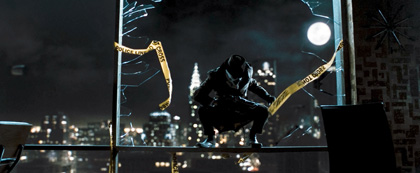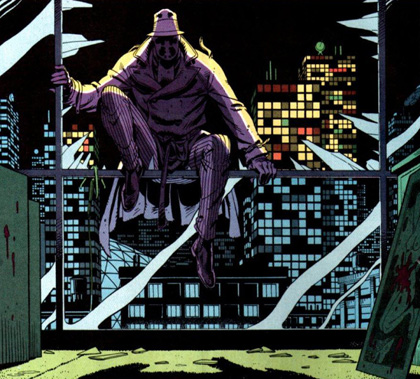
The movie “Watchmen” came out yesterday and I can’t say that I am going to be buying it.
On paper, it looks like the perfect fit for a comic book fan. The director is Zack Snyder, who did the successful “300″ a few years back, which was based on the graphic novel of the same name by Frank Miller. The actors are all top notch. The visuals look like they were drawn to perfection by the original artist, Dave Gibbons. And Malin Ackerman is so pretty. But it fails. It fails so brilliantly. Like I’ve said, I am not the most hardcore of comic book fans. I know people who can tell you how many panels there are that feature the Smiley Face logo. I know people who are so devoted to the source material, they refuse to see the movie. I don’t land in either of those camps, or at least I didn’t when I bought my ticket for the midnight showing back in March. I was beyond excited. I watched the Muse-dubbed trailer several times in anticipation, but while I don’t know if I admitted it to myself at the time, I could see the mirage starting to crack even there. The first hint was pointed out to my by Newsweek. The trailer called Snyder “visionary.” That is a title for someone like George Lucas or Stanley Kubrick or Quentin Tarantino. Not someone who has only had two films under his belt, both of which are re-makes/adaptations of some a classic zombie movie and a historically dubious graphic novel (’Dawn of the Dead” and “300″ respectively). I could go on and on about the instant legend mindset of today, where anyone who has a $100 million dollar hit movie becomes our generation’s John Hughes/John Ford/John Huston, but I feel that tangent is necessary except needless to say that Snyder does not fit in with any of those Johns.
My big hang-up with “Watchmen” the movie is that it completely disregards the whole importance of “Watchmen” the comic book. What makes the comic book so special in the hearts of readers is that nothing like it had been done before. The book was released in 1986 at the dawn of the “Bronze Age” of comic books, or rather at the end of the “Silver Age.” To make a short example of what these terms mean, imagine every thing you know about comics. The bright colors, the heroic, unnatural dialogue, the bizarre death-traps that the hero gets out of at the nick of time, the entire lack of actual danger or real suspense. Now add all of that into the campy 1960s Adam West “Batman” show and you have the “Silver Age” of comics that went through the 1960s and 70s. When “Watchmen” started, nothing like it had really been published in the mainstream and it really opened up what comics could do following the decline of “Silver Age”-type story lines. It was truly revolutionary (here is where I am plugging this book). Now look at “Watchmen” the movie and see that everything on that screen has been seen before. Dark heroes (“Batman Begin/The Dark Knight,” “Spawn”), comic book period-piece (“The Shadow,” “The Rocketeer”), a team of superheroes (The “X-Men” films), ultra violence (The “Blade” films, “Sin City,” “300”), all that is on the screen has been done before in either comic book movies or movies in general. The only thing that hasn’t been done before is, to borrow from the analysis done by Geoff Boucher of the Los Angeles Times, an “oddly off-putting Owl Ship sex scene and, of course, the unforgettable glowing blue penis.”
When I saw “Watchmen,” I almost walked out. The only thing that stopped me was that I had gotten a ride and didn’t like the thought of sitting in the lobby by myself. But the ending just completely ruined it for me.
(STOP READING IF YOU DO NOT WANT THE ENDING RUINED FOR YOU. I’M ABOUT TO NERD OUT)
It is about the failings of man, that’s the whole story. The original ending is about a third party threat, a fake alien dreamt up to wipe-out New York by the villain, Ozymandias. This unknown alien threat brings the impending nuclear war to a halt and returns the world to sanity. The movie’s end, with the reveal of Dr. Manhattan being the source of the destruction, would not have brought the world to peace. Dr. Manhattan is shown through out the film to be an American. He was on the American frontline in Vietnam and is on the American government’s payroll. If an American government worker blew up a foreign building, don’t you think there would be repercussions to the United States? And the beauty of all of this is that in the original, everyone just accepts it (except the black-and-white world view of Rorschach). There is no secret vendettas or slug fights, just a quiet, cowardly acceptance, a complete reversal of the heroic nature of the comic book super heroes that came before. That is completely lost in the movie and why it ultimately fails.
“Watchmen” the film is an clear example of the continued misinformed views of comic books as it turned one of the greatest examples of a comic book into an average popcorn flick (at best). Even with amazing comic book films out there (the new Batman series springs to mind immediately), there still exist those who box in what a comic book film can do or what it should do. This is a medium that is older than television and yet it can only muster the likes of Zack Snyder to represent it.
So please, do yourself a favor. If you find yourself holding thirty bucks, staring at a copy of the “Watchmen” DVD, just put the money into your pocket and save it until you can get a copy of the paperback version of “Watchmen.” It’s worth the money.

Photos courtesy of Warner Bros. Pictures


No comments:
Post a Comment